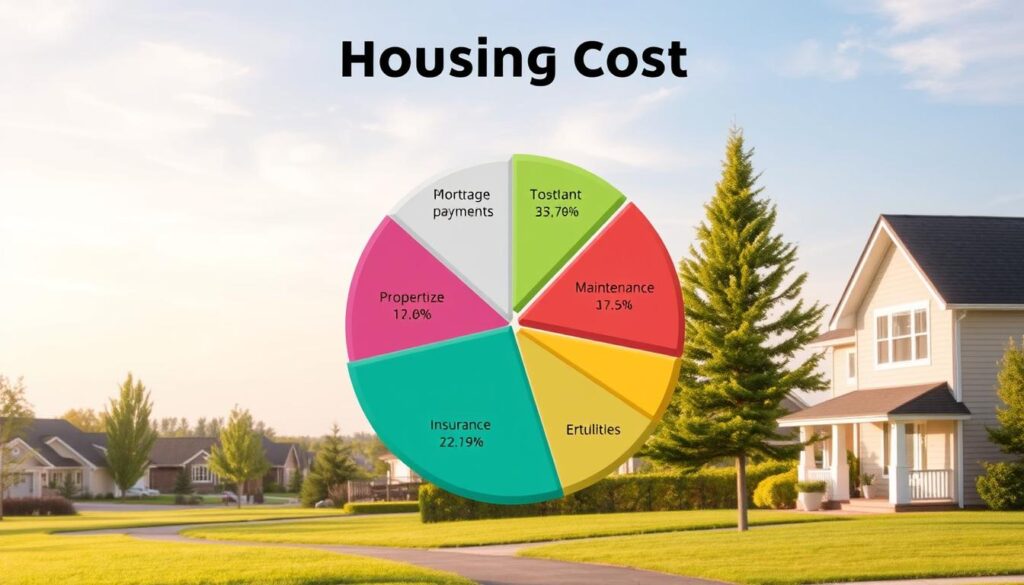Are you always struggling to make ends meet, even when you work hard? Your money management habits might be the problem. Financial mistakes can keep you stuck in a cycle of financial trouble, even if you earn enough.
A recent study shows a worrying trend in Americans’ financial health. A huge 35% of adults said their finances got worse last year, the highest since 20121. This highlights the need for good financial planning and avoiding common mistakes that can harm your financial health.
There are many ways to mess up your finances, from not budgeting to misusing credit cards. Knowing these mistakes is the first step to breaking free from the cycle of living paycheck to paycheck. It’s a step towards a secure financial future.
Let’s look at ten personal finance mistakes that might be keeping you broke. We’ll also share practical ways to fix these issues. By tackling these problems, you can take charge of your money, increase your savings, and work towards long-term financial success.
Use budgeting apps to track spending in real-time. This keeps you on track and helps spot where you overspend. Good financial management is about lasting habits, not just quick fixes6.
Remember, your emergency fund is for real emergencies only. Don’t use it for non-essential things and refill it quickly if needed8. By focusing on your emergency savings, you’re building a strong financial safety net against life’s surprises.



Key Takeaways
- Recognize common financial pitfalls to improve your money management
- Create a comprehensive budget to track income and expenses
- Prioritize building an emergency fund for unexpected costs
- Avoid overspending on non-essential items and luxury purchases
- Manage credit card debt responsibly to prevent financial strain
- Start retirement planning early to secure your financial future
- Make informed investment decisions based on your risk tolerance
Living Without a Financial Plan and Budget
Having a financial plan is key to reaching your money goals. Without one, you might spend too much and get into debt. Many people overspend because they don’t track their spending2. Let’s look at how to make a good financial plan.Understanding Your Current Financial Situation
First, check how much you earn and spend. Keep track of your spending to stay on budget2. This helps you find ways to save more. Knowing where your money goes is the first step to financial stability.Setting Clear Financial Goals
Set realistic financial goals to avoid overextending yourself2. It’s wise to save three to six months’ worth of expenses for emergencies3. Start small and make saving automatic to build a safety net3. This way, you can avoid future money worries.Creating and Maintaining a Realistic Budget
A good budget is essential for managing your income. Remember to account for one-time costs and emergencies to keep your budget right2. Include some money for fun to keep you motivated2. Cut down on variable costs and adjust your budget as needed for long-term success2. Automate your bill payments to avoid late fees and missed payments, saving your budget2. Keeping your credit card balances low helps keep your credit score high and your finances healthy3. By following these steps, you’ll improve your financial planning and budgeting. Remember, staying consistent is crucial for reaching your financial goals.Overspending on Unnecessary Luxuries
Overspending can lead to debt. Over 60% of Americans live paycheck to paycheck4. This issue affects people with high incomes too5.Identifying Essential vs Non-Essential Expenses
Start by sorting your expenses. Essential costs are housing, utilities, food, and transportation. Non-essentials are things like dining out or subscription services. Make a budget that focuses on needs and allows for some wants.Managing Subscription Services and Recurring Costs
Subscription services can quietly take your money. Check your recurring bills and cancel unused ones. For vacations, 77% of Americans spend annually, but 43% don’t save5. Save money each month for travel instead of using credit.Implementing the 24-Hour Purchase Rule
Impulse buying can cause overspending. Try the 24-hour rule: wait a day before buying non-essentials. This helps avoid spending you might regret. Also, remove saved payment info from online shopping to avoid quick buys.| Expense Category | Budgeting Tip | Potential Savings |
|---|---|---|
| Subscriptions | Review and cancel unused services | $20-$100/month |
| Dining Out | Limit to once a week | $100-$300/month |
| Impulse Purchases | Use 24-hour rule | $50-$200/month |
Neglecting Your Emergency Fund
Having a financial safety net is key to your financial health. Many struggle with unexpected costs, with only 43 percent able to handle a $1,000 emergency from savings7. This can lead to debt from high-interest credit cards or loans. Experts say to save three to six months’ living expenses in an emergency fund89. If your income is unpredictable, like a freelancer, aim for six to twelve months’ worth9. Start small and grow your savings over time. When planning your emergency fund, think about fixed costs like rent and utilities. Also, include variable costs like transportation and healthcare9. Automating your savings makes it easier to build your fund without effort.“An emergency fund is your first line of defense against financial setbacks. It’s not a luxury; it’s a necessity.”Keep your emergency savings in a liquid account, like a high-yield savings account, for quick access8. Some accounts offer up to 5 percent annual interest, much higher than traditional banks7.
| Emergency Fund Size | Recommended For |
|---|---|
| 3-6 months’ expenses | General recommendation |
| 6-12 months’ expenses | Freelancers/Self-employed |
| $500-$1,000 | Initial goal while paying off high-interest debt |
Making Poor Housing Decisions
Housing choices can greatly affect your financial future. Making smart decisions about owning a home can help you build wealth. But, poor choices can lead to a life of debt.Understanding Total Housing Costs
When thinking about owning a home, don’t just look at the mortgage. You also need to consider property taxes, insurance, and maintenance. These costs can add up quickly. It’s wise to keep your housing costs under 28% of your monthly income10.
Avoiding Oversized Home Purchases
Just because a house is big doesn’t mean it’s the best choice. Bigger homes often come with higher taxes, more maintenance, and bigger utility bills. Think carefully about what you really need. Consider how your life might change in the future and how that will affect your home size.Managing Home Equity Responsibly
Home equity is a valuable asset, but it needs to be handled with care. Don’t use it for things you don’t really need. Using home equity loans or lines of credit for non-essential things can risk your property.“Your home is your castle, not your ATM.” – AnonymousRemember, a house is both a place to live and an investment. By making smart choices about housing costs, owning a home, and taking care of your property, you can avoid financial problems. Good housing decisions today can secure a better financial future tomorrow3.
10 Personal Finance Mistakes That Keep You Broke – And How to Fix Them
Are you finding it hard to grow your wealth? You’re not alone. Many Americans face common financial hurdles that block their path to financial success. Let’s dive into these mistakes and find ways to overcome them. Not having a financial plan is a major mistake. Over 50% of households have less than $1,000 saved, and more than 50% save less than 5% of their paycheck11. To fix this, make a detailed budget and set specific financial goals. Spending too much on luxuries can empty your wallet. Today’s homes are over 1,000 square feet bigger than in 1973, showing a trend of unnecessary spending11. Learn to tell the difference between needs and wants to cut down on unnecessary spending. Not having an emergency fund puts you at risk. Most Americans live paycheck to paycheck because they lack emergency savings11. Begin building your safety net by saving a part of your income regularly. Bad investment choices can set you back. If you invest $100 monthly at a 10% interest rate, you could have over $1.2 million by age 7012. Spread out your investments and consider getting advice from a financial advisor to make smart choices. Ignoring retirement planning is a big mistake. Start early and use tools like a Retirement Calculator to figure out what you need13. Remember, time is your biggest ally in securing a financially stable future. Getting educated on finance is key to avoiding these mistakes. People who read daily often have good financial habits, like successful entrepreneurs Elon Musk and Warren Buffet12. Improve your financial knowledge through resources, live sessions, and blogs to better manage your money. By tackling these common financial errors and using smart money management, you can build wealth and secure your financial future.Mismanaging Credit Cards and Debt
Credit card debt can quickly get out of hand if not managed right. Many Americans face this problem because they don’t fully grasp interest rates and their effects on debt.Understanding Interest Rates and Their Impact
High interest rates can make your credit card debt grow fast. It’s important to remember that carrying a balance doesn’t help your credit score. In fact, 22% of Americans think it does14. To keep a good credit score, try to use only a small part of your available credit. People with an average 800 FICO score usually use about 7% of their limit14.
Avoiding Minimum Payment Traps
Only paying the minimum on your credit card can lead to a lot of debt. Late payments can hurt your credit score a lot and cost you a lot of money. A 30-day late payment can lower your score by 17 to 83 points. A 90-day late payment can drop it by 27 to 133 points14. To avoid these problems, always pay more than the minimum and set up automatic payments.Strategies for Debt Reduction
Managing debt well needs a smart plan. First, focus on paying off the debt with the highest interest rate to save time15. You might consider combining high-interest debts into a lower-interest personal loan or moving balances to a card with a 0% introductory APR. Keep in mind that balance transfer fees usually range from 3% to 5%14. Try to use credit cards less until you’ve paid off what you owe, and using cash can help you budget better and avoid spending too much15. By understanding these key points about managing credit cards and using smart debt reduction strategies, you can control your finances and aim for a debt-free life.Ignoring Retirement Planning
Not planning for retirement can lead to financial trouble later on. Many people know they need to save, but few have a solid plan. This mistake can hurt your financial future and retirement dreams. To avoid this mistake, first figure out how much you’ll need for retirement. Think about your lifestyle, healthcare costs, and how long you’ll live. Then, start putting money into accounts like 401(k)s or IRAs regularly. If you have a job, make sure to use employer matches on your 401(k). If you’re self-employed, look into SEP IRA or Solo 401(k). Starting to save for retirement is always better than not starting at all. People over 50 can add an extra $7,500 to their 401(k) each year16. Starting early is key to saving for retirement. For example, to have $1 million by 65, you’d need to save $300 a month starting at 25. But if you start at 35, 45, or 50, you’ll need to save more16. This shows how important it is to start saving early. It’s also important to check and update your retirement plan often. Changes in life, income, and inflation can affect your goals. By staying on top of these changes and making adjustments, you can secure a better financial future in your retirement years.Making Poor Investment Choices
Investing wisely is key for your financial future. Many people make mistakes that can harm their long-term goals. Let’s look at common pitfalls and how to steer clear of them.Understanding Risk Tolerance
Your risk tolerance affects your investment choices. It’s how much market ups and downs you can handle. Young investors often take more risks, aiming for higher returns. As you get older, you might want to play it safer, adjusting your investments17.Diversification Strategies
Diversifying is vital for managing risk. Don’t put all your money in one place. Spread it across different types like stocks, bonds, and real estate. This way, you can handle market swings better and possibly earn more over time18.
Avoiding Trend-Based Investments
It’s easy to get caught up in the latest trends, but they often don’t pay off. Stick to solid, long-term investing. Look into low-cost index funds that follow big market trends. They offer diversification and usually do better than actively managed funds18. Good investing isn’t about quick riches. It’s about saving regularly, smartly allocating, and being patient. Start early, even with a little. Time works in your favor, growing your wealth through compound interest1718.“The stock market is a device for transferring money from the impatient to the patient.” – Warren BuffettBy knowing your risk level, diversifying, and avoiding trendy investments, you can lay a strong financial foundation. Regularly check and tweak your investment plan as your goals and life change1718.
Misusing Home Equity and Refinancing Options
Your home is not a piggy bank. Home equity can be useful, but using it wrong can cause financial problems. Refinancing and taking cash out means you give up some of your home’s value. Think carefully before making this choice. Refinancing might help lower your rates or pay off high-interest debt. The average credit card interest rate is 22.76%19. But, it can take three to five years to see savings before refinancing again20. A home equity line of credit (HELOC) might seem appealing. It lets you use your home like a credit card. Yet, it can lead to high interest payments and risk losing your home. If you can’t pay back, you could lose your home. Using home equity wisely is key to good mortgage management. Use it for home improvements that boost your property’s value. Don’t use it for daily expenses or luxuries. Your home is an investment, not a quick cash source. When looking at refinancing, consider DSCR refinance for investment properties. It looks at the property’s income. Most lenders want a DSCR of at least 1.2521. This could help manage your investment property’s finances. Using home equity and refinancing wisely can help your finances. But, misuse can keep you in debt. Always talk to a financial advisor before big decisions about your home’s equity.Conclusion
Financial literacy helps you avoid common money mistakes. By making a budget and sticking to it, you can avoid overspending. This way, you can save for your goals22. Start saving for emergencies, aiming for three to six months of expenses. Even small amounts each month can add up23. Using credit cards wisely is important for managing money. Always pay your balance in full each month. If you can’t, pay more than the minimum and tackle high-interest debts first23. Don’t delay in saving for retirement. Start early, even in college. Also, make the most of employer-matched 401(k) plans23. Diversify your investments to go beyond gold, bank deposits, and real estate22. Get advice from a financial advisor to make smart choices and avoid costly mistakes23. Regularly check your credit report to keep a good score. Also, plan your taxes to avoid overpaying22. By tackling these areas, you’re on your way to building wealth and securing your financial future.FAQ
How can I create an effective financial plan?
Start by checking your current financial situation. Look at your income, expenses, assets, and debts. Set clear, achievable financial goals.
Create a budget that fits your goals. Prioritize essential expenses and savings. Regularly update your plan to keep up with life changes.
What’s the best way to build an emergency fund?
Aim to save 3-6 months’ worth of living expenses. Start with small amounts like -0 a month. Increase as you can.
Automate your savings by setting up automatic transfers. Make this fund a priority to avoid using credit cards for emergencies.
How can I reduce my credit card debt?
Pay more than the minimum each month to reduce the principal balance. Consider consolidating high-interest debts into a lower-interest loan.
Create a budget to allocate more funds to debt repayment. Limit new credit card use until balances are paid down. Focus on the highest interest rate cards first.
What’s the 28/36 rule for housing costs?
The 28/36 rule helps manage housing costs. Spend no more than 28% of your income on housing expenses. And no more than 36% on total debt.
This rule ensures housing costs don’t strain your budget. It leaves room for other financial priorities.
How should I start planning for retirement?
First, estimate your retirement needs based on lifestyle, healthcare, and life expectancy. Start contributing to retirement accounts like 401(k)s or IRAs.
If self-employed, explore SEP IRA or Solo 401(k) options. Invest early, even with small amounts, for compound growth. Regularly review and adjust your plan as your income and circumstances change.
What are some strategies to avoid overspending?
Create a detailed budget with monthly income and necessary expenses. Prioritize essentials like housing, utilities, food, and transportation.
Use the 24-hour cooling-off period before buying. Track spending with budgeting apps. Remove saved payment info from online accounts to avoid impulse buys. Regularly review and cancel unused subscriptions.
How can I improve my investment strategy?
Focus on diversification, not market predictions. Invest 80% in low-risk options like index funds and 20% in higher-risk investments if desired.
Understand your risk tolerance and how it aligns with your goals and time horizon. Educate yourself on different asset classes. Start investing early and consistently, even with small amounts. Regularly review and rebalance your portfolio.
What are the risks of using home equity like a credit card?
Using home equity like a credit card is risky. It increases your debt and puts your home at risk if payments are missed. This approach can lead to unnecessary interest payments and reduce your home ownership stake.
While refinancing or using home equity might be useful for specific needs, treat it responsibly. Avoid using it as an easy source of spending money.
How can I improve my financial literacy?
Read reputable personal finance books, websites, and blogs. Follow financial experts on social media for tips and insights. Take advantage of free online courses or workshops.
Practice budgeting and tracking expenses to gain experience. Consider working with a financial advisor for personalized guidance. Stay informed about economic news and its impact on your finances. Remember, financial education is an ongoing process.
What’s the importance of understanding my risk tolerance in investing?
Understanding your risk tolerance is key in investing. It helps create a strategy that fits your financial goals and comfort level. Your risk tolerance determines how much volatility you can handle in your portfolio.
It’s influenced by your age, financial goals, income stability, and personal temperament. Investing according to your risk tolerance helps you stick to your plan during market fluctuations. Regularly reassess your risk tolerance as it may change with life circumstances and as you near your financial goals.
Source Links
- https://www.investopedia.com/personal-finance/most-common-financial-mistakes/
- https://students.1fbusa.com/money-smarts/common-budgeting-mistakes-and-how-to-fix-them
- https://www.experian.com/blogs/ask-experian/bad-money-habits-and-how-to-break-them/
- https://www.iwillteachyoutoberich.com/bad-money-habits/
- https://www.debt.com/budgeting/why-am-i-broke/
- https://www.cnbc.com/select/psychological-habits-that-actually-cause-you-to-spend-more-money/
- https://www.bankrate.com/banking/savings/bad-money-habits-to-break/
- https://www.experian.com/blogs/ask-experian/emergency-savings-mistakes-to-avoid/
- https://www.linkedin.com/pulse/emergency-fund-your-financial-safety-net-starterscfo-ipvlf
- https://www.sofi.com/learn/content/overcoming-these-15-horrible-financial-decisions/
- https://spero.financial/top-seven-personal-finance-mistakes/
- https://www.linkedin.com/pulse/7-money-mistakes-keep-you-broke-boluwatife-aaron
- https://lxme.in/worst-financial-decisions-and-how-to-recover-from-them/
- https://www.cnbc.com/select/common-credit-card-mistakes/
- https://www.nbc.ca/personal/advice/credit/tips-financial-problems.html
- https://www.kiplinger.com/slideshow/retirement/t047-s001-retirement-mistakes-you-will-regret-forever/index.html
- https://lffinancialplanning.co.uk/10-common-financial-planning-mistakes/
- https://www.personalfn.com/dwl/Financial-Planning/9-mistakes-to-avoid-in-financial-planning
- https://www.marketwatch.com/guides/savings/bad-money-habits/
- https://www.cnbc.com/select/ways-people-waste-money/
- https://topflitecd.com/resources/dscr-refinance-cash-out-guide/
- https://www.personalfn.com/dwl/Financial-Planning/12-common-financial-planning-mistakes-and-the-ways-to-avoid-them
- https://medium.com/mind-talk/financial-mistakes-youre-probably-making-and-how-to-fix-them-50c29bc90ba2




